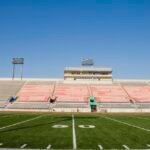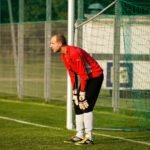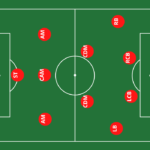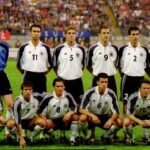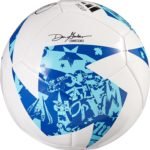- Last Updated -
Slower Soccer Players: Slowness Doesn’t Equal Failure
Soccer is a game that’s constantly evolving. New tactics, styles of play, and formations are always emerging, making it essential for players to have a good understanding of the game. One of the most crucial components of soccer is the positions on the field. So today we will look at the best soccer positions for slower players.
It’s important to understand your role and responsibilities as a player in each position. Speed is often considered an essential component in soccer, but it’s not everything.
Soccer positions require different skill sets, and there are plenty of opportunities for slower players to excel. In this article, we’ll explore the best soccer positions for slower players and how they can use their strengths to succeed on the field.
Ball control is key in soccer, and slower players can often be excellent at maintaining possession of the ball. They also tend to have better positioning on the field since they rely less on speed alone.
Tactical understanding and soccer IQ are also crucial components that can give slower players an edge over their faster counterparts. The goalkeeper position does not require much speed at all.
Physical strength is more important here, as goalkeepers need to be able to make quick reactions and powerful jumps when blocking shots. The midfield position can also be a great fit for slower players who possess excellent ball-control skills and tactical understanding.
A deep-lying playmaker or holding midfielder role would allow them to contribute significantly to their team’s strategy while minimizing their reliance on speed. We’ll explore the striker position where slow but strong players who possess good positioning skills can shine with fewer sprints but much effectiveness during set pieces.
Overall, it’s clear that speed isn’t everything in soccer positions; there are many factors involved in success on the field. With strategic thinking, proper positioning, and ball control skills that complement physical strength – Slower Players will find themselves excelling in various positions where they thought otherwise was impossible before!
Article Quick Takeaways
Soccer is a unique sport that requires a combination of physical strength and technical prowess. While speed is important in soccer, it is not the end-all-be-all factor that determines success on the field. Slower players can still excel in this sport if they have the right skills, soccer IQ, and tactical understanding.
One key factor in a player’s success on the soccer field is positioning. Knowing where to be on the field at any given time can give players an advantage over their opponents.
This is especially important for slower players who may not have the speed to outrun their opponents. By being in the right place at the right time, slower players can intercept passes, block shots, and make crucial plays that can turn the game in their team’s favor.
Another important aspect of soccer strategy for slower players is ball control. Slower players may not be able to outrun their opponents, but they can compensate for this by having excellent ball control skills.
Being able to handle the ball with ease and precision allows slower players to dictate play and make key passes that set up scoring opportunities. Slower players need to understand which positions are best suited to their strengths and weaknesses.
While it may seem like slower players should avoid positions like striker or winger that require speed, there are still plenty of roles on the field where they can excel. Positions like goalkeeper or deep-lying playmaker in midfield require different skills than what traditional fast-paced positions demand; these positions rely more heavily on tactical understanding of soccer and positioning rather than raw speed.
Overall, while speed may be an advantage in soccer, it’s not everything. Slower players who focus on improving their positioning skills, ball control abilities, and understanding of tactical strategy can still compete at a high level and contribute greatly to their team’s success on the field.

Understanding Soccer Positions
Soccer is a game that requires each player to have an understanding of their position and how it fits into the overall strategy of the team. Each position on the field has its unique role, and players are trained to excel in these roles, which often require different skill sets.
is essential for players as it enables them to make informed decisions on the field. The goalkeeper is perhaps the most important position on any soccer team.
They are responsible for keeping the ball out of their net, and their positioning can play a significant role in determining the outcome of a match. The goalkeeper‘s primary responsibility is to stop shots on goal, but they also need to be good at controlling crosses and organizing their defense.
Another crucial position in soccer is the striker. Strikers are often regarded as one of the most glamorous positions in soccer because they are primarily responsible for scoring goals.
They need to be fast, and agile and have excellent ball control skills as they navigate through opposition defenders towards the goal. However, speed isn’t everything when it comes to playing striker; physical strength and tactical understanding are also crucial attributes.
We have deep-lying playmakers (midfielders). These players typically sit deeper on the field than attacking midfielders but higher up than defensive midfielders.
They act as a link between defense and attack by providing passes that break down opposing defenses while simultaneously protecting their backline with intelligent positioning. Deep-lying playmakers require high levels of soccer IQ and vision since they must identify opportunities for passes while reading opposition movements that could lead to counterattacks.
Understanding soccer positions is critical in ensuring that each player performs optimally during a game. While each position has its unique requirements, all players must possess excellent ball control skills, tactical understanding, and physical strength – these attributes will help them excel regardless if they belong in faster or slower player categories considering how important positioning can be during a match.
Why Speed Isn’t Everything in Soccer
Soccer may be a game of speed, but it is also a highly strategic sport that demands players to have a high soccer IQ and tactical understanding. Speed alone cannot guarantee success on the field, especially for certain positions where positioning and ball control are more important than physical strength.
This is why slower players can still excel in soccer if they understand the game well and can apply their skills effectively. For instance, the role of a deep-lying playmaker requires excellent vision, passing accuracy, and decision-making abilities rather than pace.
The ability to anticipate the movements of teammates and opponents is also crucial in this position. Similarly, goalkeepers do not need to be fast runners; their primary focus is on positioning themselves correctly and making quick decisions when it comes to intercepting crosses or making saves.
Moreover, being a slower player can have its advantages on the field. For example, strikers who lack pace but have excellent ball control skills can hold onto possession longer than faster opponents before making decisive passes or shooting at goal.
Their ability to shield the ball from defenders using their bodies can also create space for other attacking players. While speed is undoubtedly an asset in soccer, it is not everything.
Slower players who possess a strong tactical understanding of soccer strategy and positioning in soccer as well as ball control skills can still make significant contributions to their team’s success in various positions such as deep-lying playmaker or goalkeeper. Understanding one’s strengths as a player and finding ways to apply them effectively on the field may well be more important than raw speed when it comes to winning games.
What Are The Best Soccer Positions For Slower Players?
Soccer is a sport that requires speed, agility, and endurance from its players. However, that does not mean slower players cannot excel in certain positions on the field.
Some positions require less speed and more tactical understanding, and soccer IQ. Here are the best soccer positions for slower players:
Goalkeeper: Goalkeepers are the backbone of every team’s defense. They don’t need to be the fastest or most agile players on the field because their primary responsibility is to stop shots from going into the goal.
As a goalkeeper, ball control, positioning in soccer, and physical strength are crucial skills that can override speed. A good goalkeeper must have an excellent sense of judgment about when to come out of his area to challenge an opponent or when to stay back and defend his goal.
Deep Lying Playmaker (Midfield): Deep-lying playmakers are vital cogs in a team’s midfield engine room responsible for linking up play between defense and attack while also providing defensive cover when necessary. Typically these players operate just in front of their defensive line and do not have to rely on speed as much as other midfielders who play higher up the pitch.
To excel as a deep-lying playmaker, ball control, tactical understanding, and soccer IQ are crucial attributes. Striker: While strikers require pace to outrun defenders chasing long balls over long distances; however pace isn’t everything for Strikers because these positions demand more than just raw physical attributes such as pace or strength – they require intelligent movement off-the-ball along with efficient passing ability while facing opposition defenders.
A striker‘s job is all about scoring goals; it requires skill sets such as excellent ball control with an eye for positioning in soccer strategy. While speed remains essential on a soccer pitch but there are several positions where slower players can still thrive if they possess other vital attributes such as excellent ball control or tactical understanding.
The goalkeeper is an excellent position for slower players, and midfielders often make deep-lying playmakers who can use their soccer IQ to dictate the play. Strikers require pace, but intelligent movement off the ball can compensate for a lack of speed and enable slower players to excel in the position.
Goalkeeper
The goalkeeper is a crucial position in soccer, and it is one where speed isn’t always the most important factor. Being a goalkeeper requires unique skills such as agility, good reflexes, and excellent ball control.
Slower players can excel in this position as they can rely on their quick reactions and tactical understanding to make up for their lack of speed. The goalkeeper plays a significant role in a team’s defense strategy and can make or break the outcome of a game.
Physical strength is also essential for goalkeepers. They need to be able to jump high, dive quickly, and withstand collisions from opposing players without getting injured.
Slower players may have an advantage here as they often have better physical strength than faster players due to their years of experience playing soccer. Positioning is an essential factor for goalkeepers.
They need to be well-positioned in the goal area to make saves effectively. Slow players may not be able to run as fast as their teammates, but they can use their experience and knowledge of the game to position themselves well in the net.
Being a goalkeeper requires more than just speed; it requires agility, quick reflexes, ball control, physical strength, tactical understanding, soccer strategy IQ, and positioning ability – all qualities that slower players can possess in abundance. If you are a slower player looking for an important role on your team where you can help your side win games consistently while using your strengths rather than trying too hard at compensating for your weaknesses then being a goalkeeper could be the perfect fit for you!
Deep Lying Playmaker (Midfield)
When it comes to soccer positions for slower players, midfield can be a very advantageous position. In midfield, a player’s soccer IQ and tactical understanding can be more valuable than their speed.
The Deep Lying Playmaker (DLP) is a position that is perfect for slower players who excel in ball control and tactical awareness. The Deep Lying Playmaker is a midfielder who operates in front of the defense and behind the attacking midfielders.
The role of the DLP is to link up play between defense and attack, distribute passes, and control the tempo of the game. This player needs to be highly skilled with their feet as they will often receive the ball under pressure from opposing players.
One of the key skills required for a DLP is vision. They need to have a clear understanding of where all their teammates are positioned on the field, as well as where space might open up for them to make passes or take shots on goal.
This makes it essential that they have superior soccer strategy knowledge so that they can read plays before they happen. Since speed isn’t vital for this position, physical strength in soccer becomes more important.
A DLP needs to be able to hold off opposing players who try to dispossess them while maintaining possession of the ball until an opening presents itself. Additionally, positioning in soccer plays an essential role since this player will often find themselves surrounded by opposing players when receiving passes from teammates or defenders.
Overall, slower players can thrive in soccer positions like DLP since these positions require technical skill, strategic thinking, and strong physical attributes other than speed. By excelling at these skills rather than relying solely on pace or agility, slower players may find themselves becoming key contributors to their team’s success.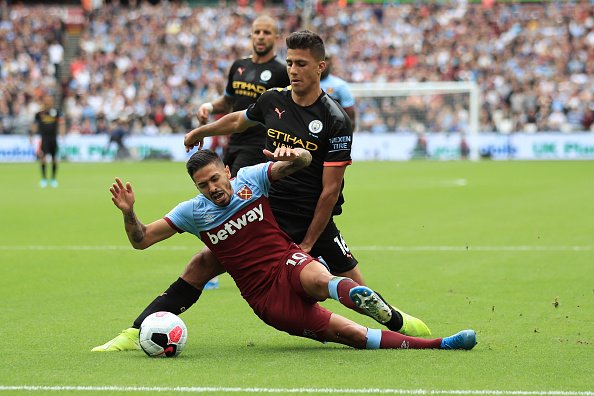
Striker
is a crucial position in soccer, and contrary to popular belief, it’s not all about speed. Slower players can also excel at the striker position if they have the right skills and tactical understanding.
One of the key attributes of a successful striker is ball control. Slower players can use their ball control skills to hold onto possession or to get past defenders by using feints and body movements.
Players like Diego Costa, Dimitar Berbatov, and Luca Toni have all been successful strikers despite not being known for their pace. These players use their positioning and technical ability to create scoring opportunities.
Soccer IQ is another essential attribute for slower players playing as a striker. A player’s ability to read the game and make quick decisions often matters more than raw speed on the field.
s need to be able to anticipate where the ball is going, where their teammates are positioned, where opponents are likely to be located, etc. s also need physical strength in soccer.
They should be able to hold off defenders while maintaining possession of the ball without being easily knocked off balance or pushed around on the field. Players like Didier Drogba are good examples of physically strong strikers who were not necessarily known for being lightning-fast.
Slower players can still be successful at the striker position if they have good ball-control skills, a high soccer IQ, and physical strength on the field. By focusing on these attributes rather than just raw speed alone, slow strikers can create opportunities that faster players might miss altogether because they lack soccer strategy or tactical understanding of positioning in soccer games.

Tips to Excel as a Slower Player in Soccer
While speed and agility are important attributes in soccer, they aren’t the only factors that determine success on the field.
Slower players can still excel by focusing on other skills and tactics. Here are some tips for slower players looking to improve their game:
Focus on Ball Control and Positioning:
One of the key ways slower players can make an impact on the field is by improving their ball control skills.
This means practicing dribbling, passing, and receiving the ball with both feet, as well as learning different moves to outmaneuver opponents. Additionally, positioning is crucial for slower players who may not be able to rely solely on speed to keep up with faster opponents.
Understanding where to stand on the field can help slower players anticipate plays and make strategic movements.
Use Your Soccer IQ:
Soccer IQ refers to a player’s ability to read the game, anticipate plays, and make smart decisions with the ball. This is especially important for slower players who need to compensate for their lack of speed with tactical understanding.
Pay close attention to how your teammates move and where they’re positioned on the field, as well as how opponents react in certain situations. By developing a strong soccer IQ, you can make up for your lack of physical strength or speed.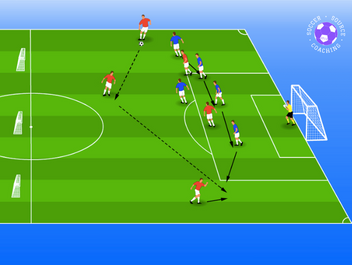
Emphasize Strengths In Your Chosen Position:
It’s important for slower players to focus on positions that play to their strengths rather than trying to compete in positions that require more speed or agility than they possess.
For example, a slow player might excel as a deep-lying playmaker in midfield or as a striker who relies more on physicality than outright speed. By finding positions that allow them to use their unique skill set, slower players can still have a major impact on the game.
While being a fast player certainly has its advantages in soccer strategy; there are many ways for slower players to excel on the field. By focusing on ball control, positioning, and soccer IQ, and emphasizing their strengths in their chosen positions, slower players can make a significant impact on the game and contribute to their team’s success.
FAQs
Q: Can slower players still be successful in soccer?
A: Absolutely. While speed is an advantage in soccer, it’s not everything.
Players who have strong ball control, tactical understanding, and a high soccer IQ can be incredibly successful regardless of their physical speed. Some of the most successful teams in history have had slower players who were able to excel due to their other skills and abilities.
Q: What is the best position for a slower player in soccer?
A: There isn’t a one-size-fits-all answer to this question since different positions require different skills and strengths.
However, positions that prioritize ball control, positioning, and tactical understanding tend to be good options for slower players. Goalkeeper is an obvious choice since speed isn’t as important in that position, but midfielders with deep-lying playmaker roles can also be a good fit for slower players since they don’t need to cover as much ground on the field.
Q: How can slower players improve their chances of success on the field?
A: One key strategy for slower players is to focus on developing their technical skills like ball control and passing accuracy.
By mastering these foundational skills, they can compensate for any lack of speed by maintaining possession of the ball and making smart passes that help move the team forward. Additionally, slower players need to understand their role within the team’s overall soccer strategy so they can make effective contributions even if they aren’t sprinting up and down the field at lightning speeds.
Conclusion
Being a slower player in soccer doesn’t necessarily mean that you cannot excel in the sport. With the right mindset, tactical understanding, and hard work, any player can thrive regardless of their physical attributes.
Remember that soccer is not just a game of speed but also one of strategy and ball control. By playing to your strengths as a slower player, such as positioning and soccer IQ, you can become an invaluable asset to your team.
Consider playing as a deep-lying playmaker or goalkeeper if you have great ball control and tactical understanding. Alternatively, if you have good physical strength and technical abilities, try playing as a striker.
Keep in mind that practice makes perfect when it comes to soccer positions for slower players. Work on improving your weak spots while focusing on enhancing your strengths.
By doing so consistently over time, you’ll be able to make significant progress in the sport. Overall, being a slower player does not impede enjoying or excelling at soccer.
It’s all about finding the right position that suits your skills and honing them through practice and hard work over time. So embrace who you are as a player and never give up on achieving your goals in this beautiful game!
Best Grip Socks For Soccer 2025
In this post, we present the best grip socks for soccer, so...
Read MoreBest Soccer Cleats for Flat Feet 2024
Unlock your soccer potential and tap into the game-changing secret: the ultimate...
Read MoreThe Historical Dominance of Brazilian Soccer in the World Cup
Introduction: The Beautiful Game's Grandest Stage The World Cup, a grand tournament...
Read MoreSoccer vs Football Field – A Tale of Two Fields
Comparing the Corners: Soccer Field Vs Football Field Shapes Let's talk a...
Read MoreUnderstanding the Offside Rule in Soccer
Soccer, also known as football, is one of the most popular sports...
Read MoreSoccer Goalie Rules: Understanding the Goalkeeper Position
As soccer players try to gain control of the game, midfielders are...
Read MoreSoccer Overtime Rules: Everything You Need to Know
Introduction: Overtime Soccer Rules Everything You Need To Know Soccer is a...
Read MoreBest Goalkeeper Gloves 2024
What are the best goalkeeper gloves? When it comes to soccer equipment,...
Read MoreDo Grip Socks Help In Soccer?
Do Grip Socks Help In Soccer? The Importance of Footwear in Soccer...
Read MoreCan Soccer Cleats Be Used For Baseball?… Pros and Cons…
Soccer and baseball are two different sports that require specific types of...
Read MoreDominate the Field With The 4-2-3-1 Soccer Formation
Soccer is a dynamic game that constantly evolves, and its tactics are...
Read MoreBest Soccer Cleats for Turf 2024
What are the Best Soccer Cleats for Turf Fields? Look no further...
Read MoreThe Transformation of German Soccer in the 2000s
Kickoff: A Brief Overview of German Soccer in the 2000s The Dawn...
Read Moresoccer position numbers quick guide
Each player on the field has an important job as it relates...
Read MoreUnderstanding the Six Soccer Defensive Positions
In this article, focused on six defensive positions: goalkeeper (GK), sweeper (SW),...
Read MoreHow To Break In Soccer Cleats
How to break in soccer cleats The Importance of Breaking in Soccer...
Read MoreWhat is a soccer tackle?
The Importance Of Mastering Tackling Skills For Success In Soccer To succeed...
Read More7 Tips To Becoming A Great Soccer Striker
A great soccer striker is a player who has the ability to...
Read MoreUnderstanding the 4-5-1 Soccer Formation
The Importance of Understanding the Formation Soccer is a tactical sport, and...
Read MoreSoccer Position Abbreviations – A Beginners Guide
Hey there! You've landed on "Decoding Soccer Positions: A Rookie's Handbook". This...
Read MoreWhat is the best soccer position to play?
What is the best soccer position? Soccer is a sport that requires...
Read MoreThe Role of a Center Defensive Midfielder
The Backbone of the Team: The Role of a Center Defensive Midfielder...
Read MoreThe Ultimate Guide to Soccer Field Size
How big is a soccer field? Read this post and get a...
Read MoreBox-to-Box Center Midfielder: The Engine of Modern Soccer Teams
Soccer is a game of skill, strategy, and teamwork. Every player has...
Read MoreDiscover the 5 different types of soccer cleats
Introduction - A brief overview of the importance of choosing the right...
Read MoreChoosing the Right Soccer Ball Size by Age
Soccer is undeniably one of the most popular sports in the world,...
Read MoreBest Soccer Cleat Insoles 2024
What are the Best Insoles For Soccer Cleat? Are you a serious...
Read MoreUS Youth Soccer: Everything You Need to Know
US Youth Soccer (USYS) is the largest youth sports organization in the...
Read MoreWhat is a goal kick in soccer? Soccer Law #16
Soccer is governed by a set of rules known as the Laws...
Read MoreHow to Clean Soccer Cleats Like a Pro
The Importance of Cleaning Soccer Cleats Playing soccer is a great way...
Read More


